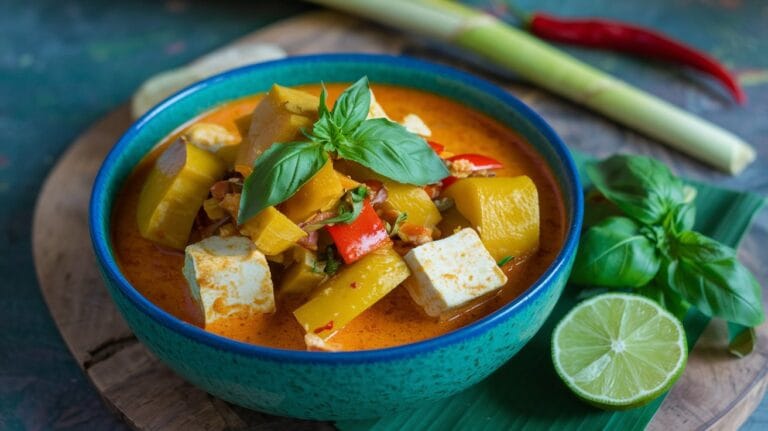If you could eat a meal that was both full of delicious flavours and good for you would you do it? That is just what Vegan Thai Kabocha Squash Curry gives you. The sweet kabocha squash, the creamy coconut milk and the strong fragrant Thai spices come together in this delicious dish to make something that is warm filling and completely plant based.
Vegan Thai Kabocha Squash Curry is a plant based version of the traditional Thai curry. It uses only healthy vegetables and no animal products. This dish is a great example of how vegan cooking can change standard recipes into versions that are both tasty and good for everyone. This food comes from Thailand where stews are a big part of everyday life and culture. Thai stews are famous for having just the right amount of sweet spicy sour and salty flavours that all work well together.
Vegan Thai Kabocha Squash Curry is popular because it can be used in many different ways and is good for you. You can easily make it your own by adding your favourite vegetables, protein sources like tofu or beans and the amount of spice you like. Kabocha squash is also very healthy because it is full of vitamins and fibre. This curry tastes great and is good for you.
The Appeal Of Vegan Thai Cuisine
Thai food is loved by food fans all over the world because it has a lot of different flavours, tastes and colours. For vegans it offers something even better: a perfect fit with eating only plants. Thai food is based on fresh veggies, fragrant herbs and creamy coconut milk. These ingredients easily fit with vegan principles making meals that are both filling and tasty.
Why Thai Cuisine Is Perfect For Vegans
Balance is important in Thai food and plant based products are often the key to that. Taste Thai food with chillies that are hot coconut milk that is sweet lime that is sour and soy sauce that is salty. It is easy to make these things vegan friendly without changing what they’re about.
Aromatic Bases Lemongrass galangal and kaffir lime leaves are base ingredients that add flavour without meat or fish.
Coconut Milk Magic This rich non dairy ingredient can be used instead of cream to make soups and stews more flavourful and smooth.
Tofu tempeh and beans are all versatile proteins that are used a lot in Thai food. This makes it easy to make veggie meals that are filling.
Thai food isn’t just a cuisine it’s a dance of flavours with every ingredient playing its part in the performance.
The Role Of Curry In Thai Cuisine
In Thai food curries are very important. These treats are like comfort food, street food and fancy treats all in one. There are many kinds of curry such as green curry, red curry and massaman curry. Each curry has its own story which is shaped by where it comes from the products that are available and cultural factors.
Thai stews are great for people who are vegan. Coconut milk goes well with veggies tofu and plant based meats because it is naturally rich. Oh the spices They make every bite warmer and more interesting. With the sweet and creamy kabocha squash in Vegan Thai Kabocha Squash Curry this traditional dish is taken to a whole new level.
Thai food is appealing not only because of its tastes but also because of its mindset. Harmony on the plate means making a meal that is more than just food, it is an experience. This makes it great for people who want tasty plant based options that don’t skimp on taste or pleasure.
Kabocha Squash A Star Ingredient
Kabocha squash which is also known as Japanese pumpkin is a wonderful food that tastes great in many different meals. Because it is naturally sweet, creamy and versatile it stands out as an element especially in Vegan Thai Kabocha Squash Curry.
What Makes Kabocha Squash Unique?
It is like getting the best parts of both a pumpkin and a sweet potato in one juicy squash. Its thick creamy texture works well in stews and the strong spices of Thai food go well with its naturally sweet flavour. Also it can be roasted, pureed or used as the main ingredient in a rich stew so it is very flexible.
Thai food lovers love Kabocha squash because it soaks up the complex flavours of curry paste and coconut milk while also adding a light sweetness of its own. Kabocha squash doesn’t get mushy when it is cooked like some other squashes do. Instead it keeps its shape which gives the dish a great texture.
Nutritional Benefits Of Kabocha Squash
Not only does kabocha squash taste great it is also very healthy
- High in Vitamin A Kabocha squash offers a notable increase in this important nutrient which is necessary for healthy skin, eyesight and immunity.
- Low in Calories Each cup has only about 40 calories so you can eat it without feeling bad.
- High in Fiber Promotes healthy digestion and helps you feel full for longer.
- Rich in Antioxidants Promotes general health and fights inflammation.
How To Select And Prepare Kabocha Squash
- Selecting Look for a squash with firm unblemished skin that feels heavy for its size. A dull matte finish is a sign of ripeness.
- Prepping While the skin is edible when cooked you may prefer to peel it. Use a sharp knife to remove the tough outer layer then scoop out the seeds and dice the flesh into cubes.
Read Also: The Best Diabetic Friendly Vegan Recipes To Start Your Day Right
Step By Step Recipe For Vegan Thai Kabocha Squash Curry
Creating a delicious Vegan Thai Kabocha Squash Curry at home is easier than you might think. With fresh ingredients and the right spices you can whip up a creamy aromatic curry that rivals your favorite Thai restaurant. Follow these steps and you’ll have a satisfying nutritious meal on the table in no time.
Main Ingredients
- 1 medium kabocha squash (peeled, deseeded, and cubed)
- 1 can (14 oz) coconut milk (full-fat for creaminess)
- 3 tablespoons Thai red curry paste (adjust for spice level)
- 1 tablespoon coconut oil (or any neutral oil)
- 2 cups mixed vegetables (e.g., bell peppers, carrots, green beans)
- 2 garlic cloves (minced)
- 1 tablespoon fresh ginger (grated)
- 1 stalk lemongrass (bruised)
- 2 tablespoons soy sauce or tamari (for a gluten-free option)
- 1 teaspoon coconut sugar (or brown sugar)
- Juice of 1 lime
Optional Toppings And Garnishes
- Fresh cilantro or Thai basil
- Crushed peanuts or cashews
- Sliced red chilies
Instructions
Prep The Ingredients
- Prepare the Kabocha Squash: Peel the squash, remove the seeds, and cut it into bite-sized cubes.
- Chop the Vegetables: Dice the bell peppers, slice the carrots, and trim the green beans.
- Mince the Aromatics: Finely chop the garlic and ginger, and lightly crush the lemongrass stalk to release its flavor.
Saut The Aromatics
Heat the coconut oil in a large pot or skillet over medium heat.
Add the minced garlic grated ginger and bruised lemongrass. Saut for 1 2 minutes until fragrant stirring to prevent burning.
Cook The Curry Paste
Add the Thai red curry paste to the pot and stir it into the aromatics. Cook for about 1 minute to release its flavors and deepen its color.
Create The Base
Pour in the coconut milk and stir well to combine with the curry paste.
Add the soy sauce or tamari and coconut sugar. Bring the mixture to a gentle simmer.
Add The Kabocha Squash
Carefully add the cubed kabocha squash to the simmering curry base.
Cover and cook for 10-12 minutes or until the squash is tender but not falling apart.
Add The Vegetables
Stir in the mixed vegetables and let them cook for an additional 5-7 minutes ensuring they remain crisp and vibrant.
Final Touches
Squeeze the juice of one lime into the curry for a burst of brightness.
Taste and adjust seasoning add more soy sauce for saltiness or lime juice for tanginess.
Serving Suggestions
- Rice Pairing: Serve the curry over steamed jasmine rice for a traditional Thai experience.
- Alternative Grains: Try pairing it with quinoa, brown rice, or even noodles for variety.
- Garnish: Top with fresh cilantro, Thai basil, crushed peanuts, and sliced chilies for added texture and flavor.
FAQs
What Makes Vegan Thai Kabocha Squash Curry So Special
This curry combines the natural sweetness of kabocha squash with the creaminess of coconut milk and bold Thai spices offering a perfect balance of sweet spicy tangy and savory flavors.
How can I make the best Vegan Thai Kabocha Squash Curry?
Use fresh high quality ingredients, adjust flavors to your taste and finish with lime juice and fresh herbs like cilantro or Thai basil for maximum vibrancy.
Is There An Indian Version Of Kabocha Squash Curry
Yes Indian kabocha squash curry features spices like cumin turmeric and garam masala often with a tomato based sauce and sometimes coconut milk for a creamy twist.
What’s The Difference Between Thai And Japanese Kabocha Squash Curries
Thai curry is bold and spicy with ingredients like red curry paste and coconut milk while Japanese curry is milder and sweeter, often using a curry roux and including carrots and potatoes.
Can I make Vegan Thai Kabocha Squash Curry without coconut milk?
Yes alternatives like cashew cream or almond milk work but coconut milk gives the dish its signature richness. Add coconut extract if you skip coconut milk.
Is Kabocha Squash Curry Healthy?
Yes It’s low in calories rich in vitamins and fiber from kabocha squash and provides healthy fats from coconut milk.
Can I Use Other Squashes In Place Of Kabocha?
Butternut squash, acorn squash or sweet potatoes are excellent substitutes though flavors and textures may vary slightly.
Conclusion
Vegan Thai Kabocha Squash Curry is a perfect blend of vibrant flavors, creamy textures and wholesome ingredients. It’s not just a dish, it’s a celebration of Thai cuisine’s brilliance combined with the nutritional benefits of kabocha squash. Whether you’re cooking for yourself or sharing with loved ones this curry offers comfort satisfaction and a burst of flavor in every bite. So roll up your sleeves gather your ingredients and bring the taste of Thailand to your table tonight!

